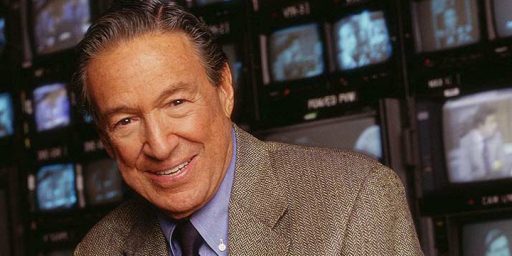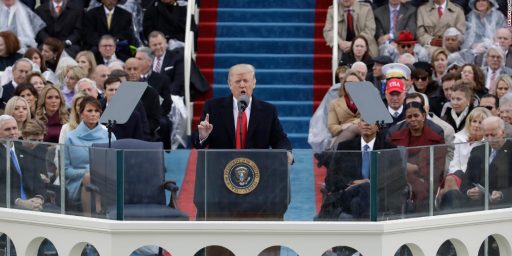Ted Sorenson, Kennedy Adviser And Speechwriter, Dead At 82
Theodore Sorensen, a speechwriter and close adviser to President John F. Kennedy, died today at the age of 82
One of John F. Kennedy’s closest advisers, and the man largely responsible for his most memorable speeches, has passed away at the age of 82:
Theodore C. Sorensen, who was a close adviser and counselor to John F. Kennedy for 11 years, writing words and giving voice to ideas that shaped the president’s image and legacy, died Sunday in New York. He was 82 and lived in Manhattan.
He died after complications from a stroke he suffered a week ago, according to his wife, Gillian Sorensen. A previous stroke, in 2001, had taken away much of his eyesight.
Mr. Sorensen said he suspected the headline on his obituary would read: “Theodore Sorenson, Kennedy Speechwriter,” misspelling his name and misjudging his work. “I was never just a speechwriter,” he said in an interview with The New York Times in 2007.
True, he was best known for working with Mr. Kennedy on passages of soaring rhetoric, including the 1961 inaugural address proclaiming that “the torch has been passed to a new generation of Americans” and challenging citizens: “Ask not what your country can do for you, ask what you can do for your country.” Mr. Sorensen drew on the Bible, the Gettysburg Address and the words of Thomas Jefferson and Winston Churchill as he helped hone and polish that speech.
But Mr. Sorensen was more than Mr. Kennedy’s ghost-writer. “You need a mind like Sorensen’s around you that’s clicking and clicking all the time,” President Kennedy’s archrival, Richard M. Nixon, said in 1962. He said Mr. Sorensen had “a rare gift:” the knack of finding phrases that penetrated the American psyche.
First hired as a researcher by Mr. Kennedy, a newly elected senator from Massachusetts who took office in 1953, Mr. Sorensen became a political strategist and a trusted adviser on everything from election tactics to foreign policy. He collaborated closely — more closely than most knew — on “Profiles in Courage,” the 1956 book that won Mr. Kennedy a Pulitzer Prize and a national audience.
After the president’s assassination, Mr. Sorensen practiced law and politics. But in the public mind his name was forever joined to the man he had served; his first task after leaving the White House was to recount the abridged administration’s story in a 783-page best-seller simply titled “Kennedy.”
He held the title of special counsel, but Washington reporters of the era labeled him the president’s “intellectual alter ago” and “a lobe of Kennedy’s mind.” Mr. Sorensen called these exaggerations, but they were rooted in some truth.
President Kennedy had plenty of yes-men. He needed a no-man from time to time. The president trusted Mr. Sorensen to play that role in crises foreign and domestic, and he played it well, in the judgment of Robert F. Kennedy, his brother’s attorney general. “If it was difficult,” Mr. Kennedy said, “Ted Sorensen was brought in.”
Mr. Sorensen was proudest of a work written in haste, under crushing pressure. In October 1962, when he was 34 years old, he drafted a letter from President Kennedy to the Soviet leader, Nikita Khrushchev, which helped end the Cuban missile crisis. After the Kennedy administration’s failed coup against Fidel Castro at the Bay of Pigs, the Soviets had sent nuclear weapons to Cuba. They were capable of striking most American cities, including New York and Washington.
“Time was short,” Mr. Sorensen remembered in his interview with The Times, videotaped to accompany this obituary. “The hawks were rising. Kennedy could keep control of his own government, but one never knew whether the advocates of bombing and invasion might somehow gain the upper hand.”
Mr. Sorensen said, “I knew that any mistakes in my letter — anything that angered or soured Khrushchev — could result in the end of America, maybe the end of the world.”
The letter pressed for a peaceful solution. The Soviets withdrew the missiles. The world went on.
Sorensen was also involved in the drafting of President Kennedy’s Inaugural Address, although he insisted that it was Kennedy himself who was largely responsible for the composition of the speech, including it’s most famous turn of phrase. The question about Sorensen’s role in the authorship of Kennedy’s works also came up in connection with Kennedy’s Pulitzier Prize winning book Profiles In Courage, which many have claimed was written primarily by Sorenson:
Questions have been raised about how much of the book was actually written by Kennedy and how much by his research assistants. Some time after April 1957, journalist Drew Pearson appeared as a guest on the The Mike Wallace Interview[2] and made the following claim live on air: “John F. Kennedy is the only man in history that I know who won a Pulitzer Prize for a book that was ghostwritten for him.”[3] Wallace replied “You know for a fact, Drew, that the book Profiles in Courage was written for Senator Kennedy … by someone else?” Pearson responded that he did, and that Kennedy speechwriter Ted Sorensen actually wrote the book. Wallace responded: “And Kennedy accepted a Pulitzer Prize for it? And he never acknowledged the fact?” Pearson replied: “No, he has not. You know, there’s a little wisecrack around the Senate about Jack … some of his colleagues say, ‘Jack, I wish you had a little less profile and more courage.'”[3]
Joseph Kennedy saw the broadcast, then called his lawyer, Clark Clifford, yelling: “Sue the bastards for fifty million dollars!”[3] Soon Clifford and Robert Kennedy showed up at ABC and told executives that the Kennedys would sue unless the network issued a full retraction and apology. Mike Wallace and Drew Pearson insisted that the story was true and refused to back off. Nevertheless, ABC made the retraction and apology, which made Wallace furious.[3]
(…)
In May 2008, Sorensen in his autobiography, Counselor, largely confirmed allegations that he had done much, if not most, of the writing. Sorensen wrote that he “did a first draft of most chapters,” “helped choose the words of many of its sentences,” and “privately boasted or indirectly hinted that [he] had written much of the book.” Sorensen claimed that in May 1957, Kennedy “unexpectedly and generously offered, and I happily accepted, a sum” for his work on the book. The sum Kennedy paid to Sorensen exceeded half the book’s royalties from its first five years of sales and led Sorensen to inform Kennedy that he was disinclined to push for recognition of his participation.
More recently, Sorensen became one of the first members of the Kennedy inner circle to endorse Barack Obama for President, and was involved at some level in the drafting of President Obama’s Inaugural Address.







I saw him speak the day before the ’68 California primary. How different things might have been…
anjin-san , Many things have been changed
“Mr. Sorensen said he suspected the headline on his obituary would read: “Theodore Sorenson, Kennedy Speechwriter,” misspelling his name and misjudging his work.”
Well, as for the first part, he was right; people would misspell his name. Here, for example 🙂
(“Ted Sorenson, Kennedy Adviser And Speechwriter, Dead At 82”)
Will this at last allow the Camelot fable to die an overdue death? Alas, likely no.